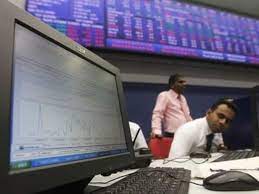http://sharetipsinfo.comJust get registered at Sharetipsinfo and earn positive returns

Share Market Closing Note
Nifty ends above 17,500, Sensex gains 450 pts led by auto, power, metals.

Among sectors, except oil & gas all other sectoral indices ended in the green.
--------------------------------------------------------------------------------------------
Topic :- Time:3.00 PM
Nifty spot if manages to close above 17540 level then expect some quick upmove in coming sessions and if it closes below above mentioned level then some sluggish movement can follow in the market. Avoid open positions for tomorrow.
--------------------------------------------------------------------------------------------
Topic :- Time:2.40 PM
CRUDEOIL Trading View:
CRUDEOIL is trading at 7077.If it holds above 7030 level then expect it to rise till 7105-7120 levels quite soon and if it breaks and trade below 7030 level then some decline can follow in it.
--------------------------------------------------------------------------------------------
Topic :- Time:2.40 PM
CRUDEOIL Trading View:
CRUDEOIL is trading at 7077.If it holds above 7030 level then expect it to rise till 7105-7120 levels quite soon and if it breaks and trade below 7030 level then some decline can follow in it.
--------------------------------------------------------------------------------------------
Topic :- Time:2.20 PM
Just In:
Bajaj Finserv hits over 3-month high; stock zooms 30% in a month
On July 28, 2022, Bajaj Finservs board had approved 1:1 bonus issue and 1:5 stock split.
--------------------------------------------------------------------------------------------
Topic :- Time:2.15 PM
Just In:
Infra assets worth over Rs 1.62 lakh crore to be monetised this fiscal: Finance Ministry.
--------------------------------------------------------------------------------------------
Topic :- Time:2.00 PM
Nifty spot if manages to trade and sustain above 17540 level then expect some quick upmove in it and if it breaks and trade below 17520 level then some decline can be seen in the market.
--------------------------------------------------------------------------------------------
Topic :- Time:1.30 PM
GOLD Trading View:
GOLD is trading at 51991.If it manages to trade and sustain above 52040 level then expect some quick upmove in it and if it breaks and trade below 51920 level then some decline can follow in it.
--------------------------------------------------------------------------------------------
Topic :- Time:1.00 PM
Nifty is rising smoothly however expect market to turn volatile now. Nifty spot if manages to trade and sustain above 17540 level then expect some quick upmove in the market and if it breaks and trade below 17500 level then some decline can follow in the Nifty.
--------------------------------------------------------------------------------------------
Topic :- Time:12.30 PM
COPPER Trading View:
COPPER is trading at 659.If it manages to trade and sustain above 660.20 level then expect some quick upmove and if it breaks and trade below 658.20 level then some decline can follow in it.
--------------------------------------------------------------------------------------------
Topic :- Time:12.00 PM
Nifty spot is trading at 17475.If it manages to trade and sustain above 17480 level then expect some quick upmove in the market and if it breaks and trade below 17460 level then some decline can follow in the Nifty.
--------------------------------------------------------------------------------------------
Topic :- Time:11.45 AM
Just In:
SBI shares decline as Q1 earnings disappoint
Indias largest lender SBI on Saturday reported a 6.7% year-on-year decline in June quarter net profit to ₹6,068 crore.
--------------------------------------------------------------------------------------------
Topic :- Time:11.30 AM
News Wrap Up:
1. Sensex up 250pts, Nifty50 above 17,450; PSU Banks bleed
2. New Sebi rules may pull the rug out from Indias bid to boost bond market
3. Tata Motors EV subsidiary buys Fords Sanand plant for Rs 725 crore
4. RILs green energy biz will outshine other segments in 5-7 years: Ambani
5. Rupee falls as strong US jobs data rekindles fear of aggressive Fed hikes
6. Hindustan Aeronautics rallies 5%, hits new high on strong business outlook
7. Steel players hopeful of export duty withdraw; okay with capex plans
8. Lack of clarity on GST paid on liquidated damages may lead to litigation
--------------------------------------------------------------------------------------------
Topic :- Time:11.00 AM
After flat to negative opening nifty is now trading with marginal gains. Nifty spot if manages to trade and sustain above 17560 level then expect some quick upmove in the market and if it breaks and trade below 17440 level then some decline can follow in the Nifty.
--------------------------------------------------------------------------------------------
Topic :- Nifty Opening Note
Indian Stock Market Trading View For 8 August, 2022:
Nifty is likely to remain volatile throughout the week. China-Taiwan development will have deep impact on metals and Gold.
For Monday:
Nifty spot if manages to trade and sustain above 17450-17460 levels then expect some quick upmove in it and if it breaks and trade below 17320 level then some decline can follow in the market. Please note this is just opening view and should not be considered as the view for the whole day.
--------------------------------------------------------------------------------------------